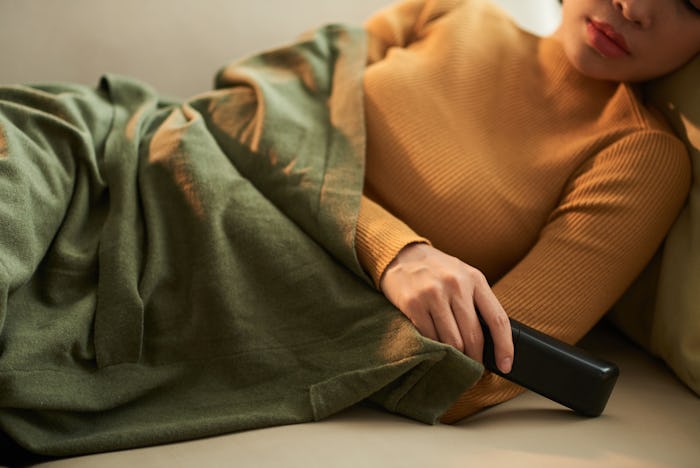Life
6 Unexpected Things That Happen To Your Brain When You Fall Asleep Watching TV
Watching TV before going to sleep isn't something that's new or different for a lot of people. And with TVs in bedrooms and streaming available on tablets and smartphones, it's perhaps not all that surprising that falling asleep while watching TV isn't all that uncommon either. There are some unexpected things that happen to your brain when you fall asleep watching TV that you might want to know more about, particularly if this is something that you do on a nightly or nearly nightly basis.
You might assume that watching TV right before shutting your eyes and falling asleep for the night isn't a good idea because it will always make sleep way worse, but the situation is a little bit more complicated than that. Though there are certainly some big things that might be a bit more negative that can happen as a result of falling asleep while watching TV, there are also some other things that might be going on here as well. Whether you always fall asleep while watching TV or it's more of just an occasional, accidental thing when you fall asleep on the couch with all of the lights as well as the TV still turned on, it's a good idea to know what might be happening in your brain and body when you do.
1Cortisol Goes Up
When you watch TV while falling asleep or fall asleep when you're watching your favorite show or movie, the blue light that's emitted can cause all kinds of problems. In a piece that he wrote for HuffPost, Dr. Larry Rosen said that this blue light (which can come from laptops, smartphones, and other technology as well) can cause cortisol levels to rise. That can keep you awake instead of helping you drift off to sleep, which isn't what you want to do.
2It Might Keep You From Being Anxious About Or Overthinking What Else Is Going On Your Life
If you watch TV before you go to sleep or while you're falling asleep in an effort to calm your mind and take your mind off of the chaos of your everyday life, you might actually be on to something. In an interview with Health, Dr. Vikas Jain, MD, a sleep medicine specialist, said that the background noise that a TV can provide can help interfere with what's going on in your brain, allowing you to fall asleep more quickly instead of focusing on what's stressing you out in your everyday life.
3Melatonin Goes Down
Melatonin can help you sleep, which is why those who work night shifts and things of that nature sometimes take a melatonin supplement to help them get the sleep that they need. But as Rosen noted in his previously-mentioned piece for HuffPost, blue light can limit melatonin, which can also keep you awake because it makes you less sleepy than you would be if your melatonin levels were higher (and that blue light hadn't interfered).
4You Stay In Lighter Stages Of Sleep & Don't Get Enough Deeper Sleep
Deeper sleep is needed if you're going to reap all the benefits of a good night's sleep, so if you're not getting that, your sleep quality isn't as great as it could be. The National Sleep Foundation noted that falling asleep while watching TV could keep you in lighter stages of sleep instead of letting you get the quality that you need.
5Depending On What You're Watching, It Might Make Anxiety Worse
If you watch the wrong sorts of things right before bed, you might notice that you are actually more anxious and upset when you try to go to sleep, rather than calmer. The aforementioned post from the National Sleep Foundation noted that violence, thrillers, and more can make you more anxious, which isn't what you wanted when you turned on the TV before bed.
6You Can Become Reliant On Using TV To Sleep
If you're using TV to help you fall asleep every single night, even if you don't realize that you're doing it, you might want to make sure that you don't become too used to it. As Jain told Health in the previously-mentioned article, you might become dependent on falling asleep with the TV on, which makes it difficult (or impossible) for you to sleep when you can't watch TV before bed.
If you watch TV when you fall asleep (or you're accidentally falling asleep on the couch while catching up on your favorite shows), know that it can have some effects on you. But whether those effects are a net positive or net negative is a bit more difficult to determine. If you're doing what you can to limit blue light and using it more for noise, it might not be as terrible as you think. But if you can sleep without it, you might find that that's what's best.
